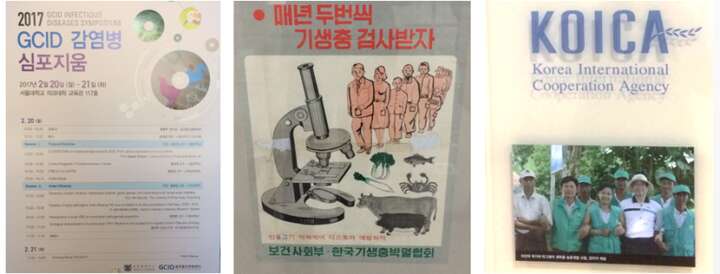
By Professor Russell Stothard
The Global Center for Infectious Diseases (GCID) is part of Seoul National University College of Medicine and directed by Professor Eung-Soo Hwang. Each year the GCID holds an international symposium which aims to bring together national and international researchers to discuss current health-related issues. It also seeks to initiate and solidify collaborations aligned within its two departments, The Department of Microbiology & Immunology (DMI) and The Department of Tropical Medicine & Parasitology (DTMP), respectively.
Invited by the Head of DTMP, Professor Min-Ho Choi, I was honoured to give the first keynote presentation at the 2017 GCID Infectious Diseases Symposium and discuss schistosomiasis-related work in Africa. I took the opportunity to feature the importance of female genital schistosomiasis (FGS) and our previous FGS workshop, as well as recent COUNTDOWN activities and publications. The previous year, Professor Choi had visited the Liverpool School of Tropical Medicine (LSTM) and was keen to develop shared interests in research and teaching further. To this end, we co-supervise an LSTM-PhD student, Dr Sunghye Kim, who has been developing an island-wide STH control programme on Fiji on the back of transmission assessment surveys for lymphatic filariasis. This receives support from the Korea International Cooperation Agency (KOICA), the Korean equivalent to DFID, UK.
Established in the early 1950s, the DTMP has a long history in medical parasitology and exemplary scholarship in intestinal trematodes, describing their lifecycles and epidemiology. Several key staff, for example Professors Seo and Lee, have been seminal in developing country-wide control programmes in Korea. These have been eminently successful, for with consolidated intersectoral action, extensive diagnostic screening with bi-annual treatment and appropriate health education as well as general socioeconomic development have resulted in elimination of STH in Korea as a public health problem. This is a tremendous achievement, however, without a significant within-country burden, the DTMP has realigned itself today with bilateral efforts to control disease elsewhere, in particular in Africa.
Recent research and control undertaken by DTMP in Sudan against schistosomiasis and funded by KOICA was presented by Professor Sung-Tae Hong who had also undertaken numerous clinical assessments of bladder pathology by ultrasonography. Later in the week, we discussed at length the growing importance of FGS and I shared with him my copy of the FGS pocket atlas. The intention is to develop a better understanding of FGS and assess if a pilot gynaecological examination could be performed in adult women. Incidentally, if KOICA were to become better aware of the importance of FGS it might open up efforts within their educational and medical outreach projects to improve the health of adult women and those of child-bearing age elsewhere.
During the remainder of the 2017 GCID Infectious Diseases Symposium we discussed with colleagues within the DMI, the status of current viral influenza epidemics and the importance of preparedness for novel strains that might arise, for example H7N9. The emergence of this viral variant is of concern and orchestrates an intercontinental need for rapid molecular surveillance. On a related point of better disease surveillance, I was happy to point out that COUNTDOWN was using similar molecular DNA diagnostic tools newly embedded within the polio surveillance network and highlighted Lucas Cunningham’s and Emily Adams’ exciting results on the use of real-time PCR assays in Ghana.
After the symposium, the following morning I gave a similar presentation to the Korean Society for Parasitology then later in the afternoon a more career-focused presentation to a group of medical students. These were united by a student-action body across Seoul universities and were each interested in global health and wishing to known how best to contribute. I was impressed at their general knowledge and how one student had already volunteered to assess refugee health in Germany in light of the Syrian crisis. Later in the week I was warmly hosted by the DTMP and I took part in their laboratory meeting. There, we discussed recent efforts on developing a LAMP assay for schistosomiasis and I was able to share with them Corrado Minetti’s recent publication.
Upon leaving Korea and looking to the future, we are now thinking of ways to further our shared interest and synergise activities. It is fortunate that Professor Choi is serving on the local organising committee for the next International Congress on Parasitology, for we are aiming to organise a special session on schistosomiasis control to feature future results from the DTMP and COUNTDOWN networks. This is certainly something we should all look forward to.
